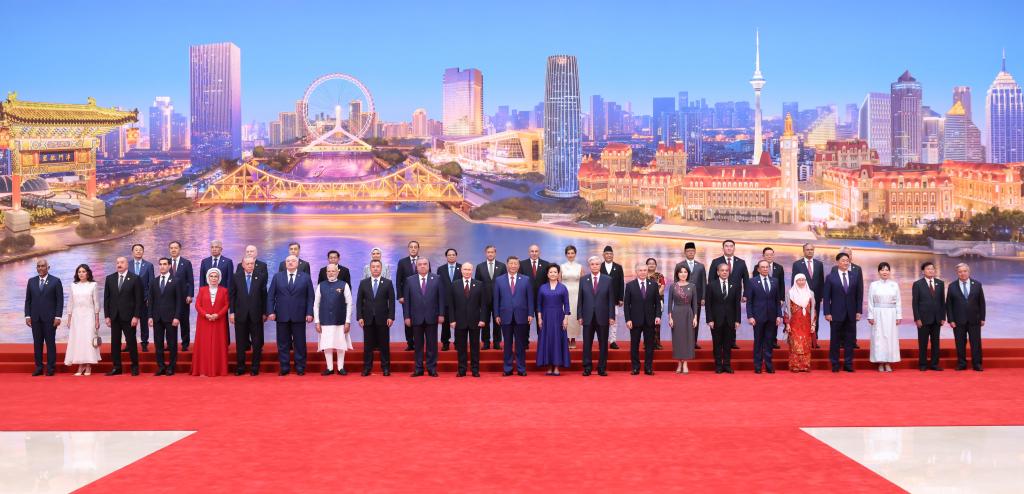Introduction
The Shanghai Cooperation Organisation (SCO), established in 2001, is a major intergovernmental alliance comprising countries from Asia and Eurasia. Its founding members included China, Russia, Kazakhstan, Kyrgyzstan, Tajikistan, and Uzbekistan, later joined by India and Pakistan in 2017, and Iran in 2023. The SCO aims to foster regional security, economic development, connectivity, and cultural cooperation among member states.
The SCO Summit 2025, held in Tianjin, China, was pivotal for both India and global geopolitics. The summit focused on counterterrorism, regional stability, economic cooperation, energy partnerships, and climate change, reflecting the organization’s growing influence in a rapidly multipolar world. For India, the summit represented strategic opportunities to enhance connectivity and security, while balancing relations with China and other regional powers.
For aspirants of UPSC, SSC, State PCS, and similar exams, understanding the nuances of the SCO Summit 2025 is vital. These MCQs are designed to help students master current affairs, international relations, and global event trends for better exam scores.
Multiple Choice Questions (MCQs) on SCO Summit 2025
SCO MCQs for UPSC | Current Affairs 2025
1. Where was the SCO Summit 2025 held?
a) Beijing, China
b) Almaty, Kazakhstan
c) Tianjin, China
d) New Delhi, India
Answer: (c) Tianjin, China
2. What year was the Shanghai Cooperation Organisation launched?
a) 2000
b) 2001
c) 2002
d) 2005
Answer: (b) 2001
- (a), (c), (d) Years do not match the founding date.
3. Which country hosted the SCO Summit 2025?
a) Russia
b) India
c) China
d) Iran
Answer: (c) China
- China held the summit in Tianjin.
4. Which member joined SCO in 2023?
a) Mongolia
b) Kazakhstan
c) Iran
d) Turkey
Answer: (c) Iran
- Iran became a full member.
5. The Tianjin Declaration condemned the terrorist attack in:
a) Khuzdar
b) Pahalgam
c) Jaffer Express
d) Urumqi
Answer: (b) Pahalgam
- Focus was on the April 22, 2025 attack in Pahalgam.
6. SCO’s key agenda does NOT include:
a) Counterterrorism
b) Space exploration
c) Economic cooperation
d) Cultural exchange
Answer: (b) Space exploration
- SCO focuses on security, economy, and culture.
7. What framework handles security in SCO?
a) RATS
b) BRICS
c) ASEAN
d) SAARC
Answer: (a) RATS
- Regional Anti-Terrorist Structure.
8. Which countries joined SCO together in 2017?
a) Iran and Belarus
b) India and Pakistan
c) Turkey and Mongolia
d) Russia and China
Answer: (b) India and Pakistan
- Both joined in 2017.
9. Which city was avoided in naming with respect to terrorism in Tianjin Declaration?
a) Islamabad
b) Astana
c) New Delhi
d) Tehran
Answer: (a) Islamabad
- Pakistan avoided direct mention despite accusations.
10. SCO Summit 2025 focused on cooperation in:
a) Oil and Gas
b) Automotive
c) Pharmaceuticals
d) Luxury goods
Answer: (a) Oil and Gas
- Energy cooperation is a major agenda.
Analysis/Notes Section After First 10 MCQs
- SCO Summit 2025 in Tianjin, China: Core themes included regional security, economic growth, and counterterrorism.
- India’s Role: Balancing ties with Central Asia, China, Russia; focus on terror concerns and connectivity.
- Global Impact: SCO acts as a counterweight to Western alliances, promoting a multipolar world order.
11. Which structure aids SCO’s joint security actions?
a) UNGA
b) RATS
c) NATO
d) G7
Answer: (b) RATS
- RATS deals with anti-terror framework.
12. Which SCO member is a major energy producer?
a) India
b) Kazakhstan
c) Mongolia
d) Belarus
Answer: (b) Kazakhstan
- Kazakhstan is a notable energy producer.
13. Belt and Road Initiative is promoted in partnership with:
a) BRICS
b) SCO
c) EU
d) AU
Answer: (b) SCO
- China seeks synergy with SCO.
14. Who has sovereignty responsibility in fighting terrorism?
a) SCO
b) UN
c) Sovereign states
d) Interpol
Answer: (c) Sovereign states
- Declaration emphasized sovereignty.
15. “Multipolarity” in context means:
a) One power dominating
b) Many powers sharing influence
c) No power
d) Only West dominating
Answer: (b) Many powers sharing influence
- SCO promotes multipolar balance.
16. Which Central Asian country is an SCO observer?
a) Iran
b) Kyrgyzstan
c) Mongolia
d) Tajikistan
Answer: (c) Mongolia
- Mongolia holds observer status.
17. Summit condemned terror acts in which Pakistan locations?
a) Quetta and Lahore
b) Karachi and Islamabad
c) Jaffer Express and Khuzdar
d) Peshawar and Multan
Answer: (c) Jaffer Express and Khuzdar
- Specifically named bombings.
18. Major theme for SCO 2025 included:
a) Sports diplomacy
b) Climate change
c) Language revival
d) Space exploration
Answer: (b) Climate change
- Climate and sustainability were key.
19. Which of the following is NOT a founding member of SCO?
a) Russia
b) China
c) India
d) Uzbekistan
Answer: (c) India
- India joined in 2017.
20. Cultural exchanges encouraged under SCO?
a) Yes
b) No
c) Only for youth
d) Only for artists
Answer: (a) Yes
- Cultural and youth exchanges promoted.
Analysis/Notes Section After 20 MCQs
- Double Standards: Declaration rejected any double standards in anti-terror policies.
- People-to-People Ties: Summit encouraged cultural and academic exchanges.
- Energy Security: SCO includes both major producers and consumers, fostering cooperation.
21. Who coordinates with China as key SCO leader?
a) India
b) Pakistan
c) Russia
d) Iran
Answer: (c) Russia
- Russia’s strategic partnership strengthened.
22. SCO Summit acts as counterweight to:
a) ASEAN
b) EU
c) G7/NATO
d) OPEC
Answer: (c) G7/NATO
- SCO balances Western-led alliances.
23. What did the SCO Summit 2025 NOT produce?
a) Joint Declaration
b) Trade agreements
c) Counterterrorism tools
d) Disarmament treaty
Answer: (d) Disarmament treaty
- No such treaty mentioned.
24. Which country is both major consumer and SCO member?
a) India
b) China
c) (Both a and b)
d) Kazakhstan
Answer: (c) Both a and b
- India and China are major energy consumers.
25. Which is NOT a current SCO member?
a) Turkey
b) Iran
c) India
d) Kazakhstan
Answer: (a) Turkey
- Turkey is an observer, not a member.
26. Main security concern for SCO in 2025?
a) Nuclear arms
b) Instability in Afghanistan
c) Overfishing
d) Deforestation
Answer: (b) Instability in Afghanistan
- Afghanistan instability is a top issue.
27. What did India highlight at SCO 2025?
a) Space policy
b) Terrorism concerns
c) Currency swaps
d) None of the above
Answer: (b) Terrorism concerns
- India focused on terror issues.
28. SCO Summit 2025 is a platform for:
a) Art exhibitions
b) Rival countries’ dialogue
c) Language courses
d) Space launches
Answer: (b) Rival countries’ dialogue
- India and Pakistan engaged in talks.
29. Which organization shares similar regional impact with SCO?
a) SAARC
b) OPEC
c) FIFA
d) UNCTAD
Answer: (a) SAARC
- Both are regional organizations.
30. Outcome expected from the Tianjin Summit?
a) Disintegration
b) Joint Declaration
c) Warfare announcements
d) None
Answer: (b) Joint Declaration
- Joint declaration is a standard outcome.
Analysis/Notes Section After 30 MCQs
- China’s Diplomatic Role: Summit reflects China’s leadership drive.
- India’s Strategic Balancing: With West and East, India plays a careful diplomatic game.
- Sustainable Development: Summit called for sustainable, clean energy and environmental protection.
31. SCO Summit 2025 most closely linked to which initiative?
a) Belt and Road Initiative
b) SDG by UN
c) Paris Agreement
d) Kyoto Protocol
Answer: (a) Belt and Road Initiative
- China seeks BRI-SCO synergy.
32. Which theme did NOT feature at SCO 2025?
a) Environmental protection
b) Counterterrorism
c) Population control
d) Trade cooperation
Answer: (c) Population control
- Not discussed.
33. SCO’s organizational nature is:
a) Political only
b) Military only
c) Economic and security alliance
d) Sporting federation
Answer: (c) Economic and security alliance
- SCO handles both spheres.
34. Which statement is TRUE for SCO Summit 2025?
a) Focused on regional instability
b) Ignored energy cooperation
c) Russia withdrew
d) Summit held in March
Answer: (a) Focused on regional instability
- Security issues were central.
35. India’s stance in SCO includes:
a) Emphasizing sovereignty
b) Rejecting counterterrorism
c) Demanding sanctions
d) Promoting arms race
Answer: (a) Emphasizing sovereignty
- India supports sovereignty-based cooperation.
36. In 2025, which is NOT a SCO observer or dialogue partner?
a) Mongolia
b) Belarus
c) Turkey
d) Iran
Answer: (d) Iran
- Iran is now a full member.
37. The main role of RATS is:
a) Economic analysis
b) Counterterrorism cooperation
c) Trade agreements
d) Elections monitoring
Answer: (b) Counterterrorism cooperation
- RATS deals with anti-terror operations.
38. Which new agreements were expected at SCO 2025?
a) Military pacts
b) Economic and trade agreements
c) Sports competitions
d) Literary prizes
Answer: (b) Economic and trade agreements
- Economic cooperation was key.
39. Tianjin Summit is significant for:
a) Sporting event
b) Shaping global multilateral cooperation
c) Currency reforms
d) None
Answer: (b) Shaping global multilateral cooperation
- Summit shapes international relations.
40. Statement about SCO is correct:
a) SCO is globally insignificant
b) SCO fosters multipolarity
c) SCO opposes cultural exchange
d) SCO comprises only two members
Answer: (b) SCO fosters multipolarity
- SCO boosts global multipolarity.
Analysis/Notes Section After 40 MCQs
- Multipolar World: SCO supports shift from unipolar West to multipolar international relations.
- Exam Relevance: These MCQs reflect up-to-date current affairs and international diplomacy, strengthening exam preparation.
- Unique Explanations: Option-wise notes help aspirants discern correct answers, ensuring conceptual clarity.
Conclusion
Preparing for the SCO Summit 2025 through MCQs enhances understanding of international relations, security policy, and current affairs essential for UPSC, SSC, and State PCS exams. Keeping abreast of global summits, their agenda, and outcomes empowers aspirants to ace important sections of competitive exams. Bookmark this article and share it for continued learning and practice.

